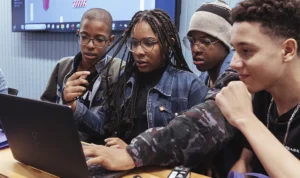The curiosity to explore the universe of technology awoke in Marcia Ferreira Castagna from Rio Grande do Sul when she was still in high school, in the early 2000s. She worked at a company that was computerizing data, which sparked her interest in programming and information technology. “I saved the money from my thirteenth salary and vacations and invested in Java and database classes. I spent my 30 days of vacation taking courses,” he says.
At the time, she combined these courses with the information systems faculty. She liked the classes. Not from that moment when students introduce themselves to their classmates on the first day of class. “Everyone there already worked in large companies and had experience with languages. I thought: 'What am I going to say? I don't even program!' I was dying of shame,” she remembers.
Today the story is quite different. At 38 years old, Marcia has a lot to say when asked what she does. After graduating in information systems at Unisinos (University of Vale do Rio dos Sinos), in 2010, she took a postgraduate course in mobile devices, worked as a systems analyst, taught at Senac (National Commercial Learning Service) and, since May 2021, it is senior software engineer and mentor in iFood.
Overcoming prejudices
Getting there was not so easy. Along the way, she had to conquer her space and overcome prejudices in an essentially male field of work. While still in college, he heard from a colleague that he shouldn't pursue programming because it was a “man's” profession.
“I went through many situations of machismo, some veiled, others blatant”, comments Marcia. “A colleague once told me that I wouldn't be hired because the manager wouldn't admit that a woman was better than a man in the technical test of the selection process.”
Despite the initial shock of this type of situation, she did not let herself be discouraged. “I think all of this just made me more eager to make things happen. Many people encouraged and supported me. This energy made me see that I only had one attitude to follow: it has to work.”
A network of women
One of the people who paved the way for Marcia was a classmate who worked as a developer and recommended her for her first position in programming: an internship where she learned in practice how to work with Delphi and Java, working as an analyst and tester.
After graduating, she specialized in application development for mobile devices, also at Unisinos, because she wanted to teach and work with mobile devices – two goals that were soon achieved. “I was always very shy, so I started to expose myself more to overcome this insecurity”, she says.
Along the way, Marcia became involved in communities to empower women programmers and in events such as Rails Girls, Django Girls and Devs Java Girl. “It’s really cool to be able to connect with people. When I saw the girls supporting and helping each other, I started to get more involved and sign up to be a coach and mentor”, she reveals. “I'm also always participating in Java communities and MeetUp events to exchange knowledge.”

Django Girls community class that Marcia participated in
Even with all this baggage, Marcia says she felt butterflies in her stomach when she was called to participate in the selection process to work at iFood. “I had imposter syndrome, I thought I didn’t have the guts for a company of this size. Even so, I decided to take on this challenge more”, he says.
She says that her nervousness and anxiety dissipated when she saw that there were women among the iFood interviewers at each stage of the process. “I had never been interviewed by a woman in the technical stage. As this environment is very masculine, feeling represented in the selection process gave me more security.”
Bye, imposter syndrome
The result is already known: Marcia left there hired. Today, she feels welcomed and represented in an environment with more diversity. “In many companies, I was the only female developer. Not here. This is where I most see women working in the area of management and development.”
Now Marcia wants to help other women succeed in the technology field. As soon as he found out about the program Let's go AI – initiative of iFood Takes Off in partnership with Resilia to train low-income people in the backend, especially women and black people – she soon volunteered to participate as a mentor.
“I liked the initiative to promote inclusion in the world of technology. The path is so much easier when we have help. Therefore, I seek to give back to the community, in some way, for the support I received.”
For her, Vamo AI is a two-way street, which benefits those on both sides of the mentoring. “I realized how important it is, after so many years on the road, to have this contact with those who are starting their careers. In addition to exchanging knowledge, it is an exercise in empathy to avoid becoming that arrogant professional who thinks she already knows everything.”
What about imposter syndrome? He doesn't talk so loud anymore, says Marcia. “What has changed is that today I look for challenges that encourage me to have more confidence, such as sharing more of my code on GitHub or writing articles on Linkedin.”

iFood institutional commitments
iFood initiatives for the development of women
iFood is a company committed to female representation in all areas. Today, of the 2,236 women who work at the company, 370 are in the technology area, like Marcia. They also make up the leadership base at iFood, with women occupying 43% of the positions. In senior leadership, they represent 29%.
These numbers are the result of the company's initiative to hire, develop and promote more women. Since 2020, iFood has had a specific program to develop the skills of these professionals and reduce the gender gap in leadership positions — the Now They Are Them.
To promote diversity and inclusion, the company also offers development paths and specific programs, such as Reprogram (professional training in technology for women in vulnerable situations) and Vamo AI (training in backend development for women and low-income black people).
With these actions, iFood's goal is to reach 2023 with 50% of women in leadership and 35% in the top leadership. After all, promoting a more diverse environment with more women in leadership is one of the platform's commitments on its path to designing a more inclusive future with more opportunities for everyone.


